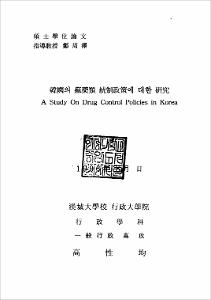韓國의 痲藥類 統制政策에 대한 硏究
= (A) study on drug control policies in Korea
- Files in This Item:
-
-
Download
 000000066354.pdf
기타 데이터 / 3.27 MB / Adobe PDF
000000066354.pdf
기타 데이터 / 3.27 MB / Adobe PDF
-
Items in Repository are protected by copyright, with all rights reserved, unless otherwise indicated.